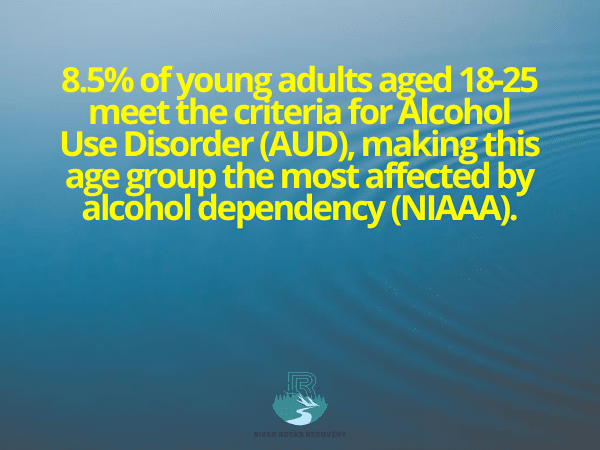Alcoholism can affect anyone, but young adults confront distinct problems that make recovering from it more difficult than other age groups. With cultural pressures, mental health difficulties, and the transitional period of approaching adulthood, managing alcohol addiction in young adults necessitates a personalized strategy.
In this article, we’ll look at the unique issues that young adults confront with alcohol addiction, why specialized recovery programs are important, and how they can lead to a better future.
Understanding Alcohol Addiction in Young Adults
Young adulthood is a time for exploration and experimentation. Many young adults start drinking socially, but they quickly develop binge or dependence tendencies. Peer pressure, scholastic stress, and newfound independence are common causes of increasing alcohol intake.
Furthermore, the brain is still maturing during early adulthood, particularly in areas such as decision-making and impulse control. This renders young individuals more prone to dangerous conduct and addiction.
Symptoms of Alcohol Addiction in Young Adults
Recognizing addiction in young adults can be difficult. Some common indicators are:
- Regular binge drinking or drinking alone.
- Neglecting obligations in school, employment, or home.
- Changes in mood, such as irritation or depression.
- Increased secrecy or distance from family and friends.
- Physical symptoms include weariness, weight fluctuations, and poor hygiene.
How Alcohol Rehab Programs Address Young Adults’ Needs
Rehab centers like River Rocks Recovery design programs specifically for young adults, incorporating age-appropriate strategies and support systems.
1. Comprehensive Assessment and Individualized Care
- Young adults undergo a thorough evaluation to identify the severity of their addiction and any co-occurring mental health conditions.
- Personalized treatment plans address the unique needs and goals of each individual.
2. Age-Specific Therapy Groups
- Group therapy sessions bring together young adults with similar experiences, fostering connection and reducing feelings of isolation.
- Peer support helps participants develop a sense of community and accountability.
3. Life Skills Training
- Rehab programs teach essential life skills, such as financial management, time management, and effective communication.
- These skills help young adults navigate the responsibilities of adulthood without relying on alcohol.
4. Family Involvement
- Family therapy addresses the dynamics that contribute to addiction and strengthens support systems.
- Educating families about addiction helps them provide effective encouragement and accountability during recovery.
5. Relapse Prevention Strategies
- Young adults learn to identify triggers, develop coping mechanisms, and create a solid relapse prevention plan.
- Continued support through programs like Sober Living Program ensures a stable, substance-free environment during the transition to independent living.
Unique Challenges in Treating Young Adults
1. Social Pressure and Peer Influence
Drinking is frequently associated with social activities for young adults, making it difficult to distance themselves from circumstances that promote alcohol intake. Fear of loneliness or rejection may limit their motivation to seek assistance.
2. Co-occurring Mental Health Issues
Anxiety, despair, and trauma are common mental health issues among young adults. These difficulties frequently coexist with substance dependence, resulting in a difficult-to-break cycle that must be addressed simultaneously.
3. Lack of life skills
Many young individuals are still learning important life skills like budgeting, maintaining healthy relationships, and setting limits. Alcoholism can further impede this development, making long-term recovery more challenging.
4. Resistant to Authority
Young adults may be resistant to standard therapeutic procedures because they feel misunderstood or are unwilling to interact with authority individuals. This makes it critical for rehabilitation programs to cultivate trust and establish a connection with their patients.

Why Specialized Rehabilitation Programs for Young Adults Matter
1. Age-Specific Treatment Approaches
Young adult programs are meant to address their specific experiences and challenges. This includes including peer group therapy, addressing identity and self-esteem concerns, and providing coping methods for social demands.
2. Dual Diagnosis Treatment
Many young individuals require dual diagnosis treatment to address both substance abuse and mental health issues. Integrating therapy for both promotes a comprehensive approach to rehabilitation.
3. Skill Development
Life skills training is often included in rehab for young adults to help them achieve independence and stability after their recovery. These programs teach coping mechanisms, financial management, and goal planning, allowing participants to build a prosperous future.
4. Focus on Family Involvement
Family relations have an important influence on the rehabilitation process. Family therapy sessions are frequently included in young adult rehabilitation programs to address communication issues, rebuild trust, and foster a supportive home environment.
Finding the Right Rehabilitation Program? Connect With River Rocks Recovery!
For young individuals struggling with alcoholism, the correct treatment program can make all the difference. River Rock Recovery specializes in tailored care for young adults, treating the underlying causes of addiction and promoting long-term recovery. From therapy to life skills training, we focus on the mind, body, and soul. Young adults thrive in our supportive and understanding peer environment.
Why Choose River Rocks Recovery?
At River Rocks Recovery, we specialize in providing compassionate, evidence-based care tailored to the needs of young adults.
- Experienced Team: Our staff includes addiction specialists, therapists, and medical professionals who understand the unique challenges young adults face.
- Holistic Approach: We focus on healing the mind, body, and spirit to promote overall well-being.
- Comprehensive Programs: From detox to Sober Living Program, we offer a full continuum of care to support every stage of recovery.
Conclusion
Alcohol addiction can be especially challenging for young adults, but with the right support and resources, recovery is possible. Professional rehab programs like those offered at River Rocks Recovery provide the specialized care needed to address the unique challenges young adults face and set them on a path to lifelong sobriety.
Call us today at (888) 905-6281 to learn more about our programs and take the first step toward a healthier, alcohol-free future.
FAQ for Alcohol Rehab for Young Adults
Why is alcohol rehab important for young adults?
Alcohol rehab provides tailored treatment to address the unique challenges young adults face, such as peer pressure, mental health issues, and the transitional phase of early adulthood.
What makes alcohol rehab for young adults different?
Rehab programs for young adults include age-specific therapy groups, life skills training, and support systems designed to help them navigate the unique pressures of their age group.
Can young adults recover from alcohol addiction?
Yes, with the right support and treatment, young adults can recover successfully and develop the skills needed for long-term sobriety.
What types of treatment are available for young adults?
Treatment options include Partial Hospitalization Program (PHP), Intensive Outpatient Program (IOP), Outpatient Program, and Sober Living Program to support recovery at various levels of care.
How can family members support young adults in rehab?
Family members can participate in family therapy, educate themselves about addiction, and provide ongoing encouragement and support throughout the recovery process.




























